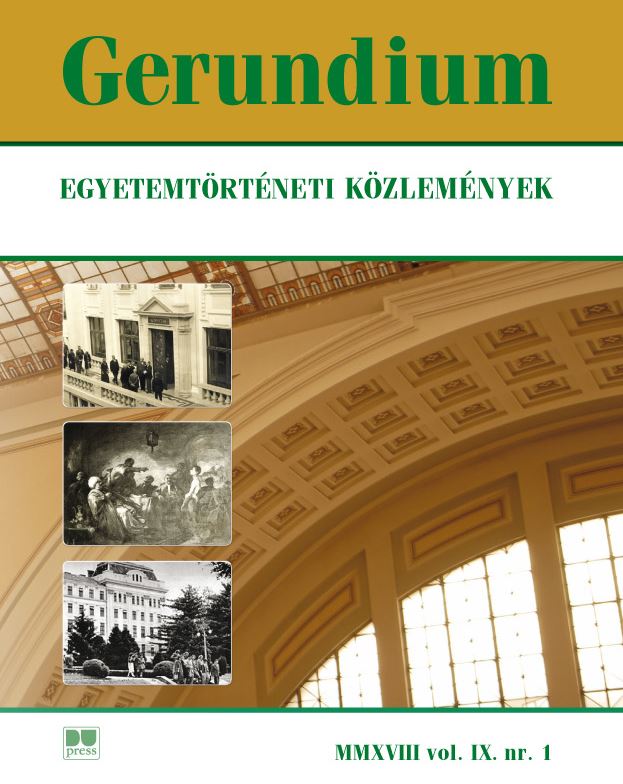Német egyetemi filozófiai hatások Schneller István morálpedagógiai rendszerében
Szerző
Megtekintés
Hogyan hivatkozzuk
Absztrakt
German Academic Effects on István Schneller’s pedagogical System. Having studied theology at German universities, Schneller István (1847–1939) got to the Department of Education at Kolozsvár University in 1895. He played an important role in having the Transsylvanian Hungarian University, suppressed in May of 1919, transferred to Szeged in the autumn of 1921. Schneller’s approach to the questions of pedagogy was that of an Evangelical theologian. He applied the term „personality pedagogy” to his pedagogy, thus referring to the fact that the process of moulding the individual into a personality was placed in the focus of his pedagogy. When searching the roots of Schneller’s moral anthropological concepts with regard to the history of ideas, the following influences are to be revealed: 1. The Protestant doctrine, the influence of the Herrenhut circle of the Evangelical Pietists, Ernst Daniel Schleiermacher’s influence. The process of becoming a member in the Domain of God is to be supported by the individual’s intimate religious experience. 2. The reception of Pestalozzi’s influence: The Swiss pedagogue’s ethical evolutionary theory is mainly discussed in the study titled „Meine Nachforschungen über den Gang der Natur…”. The three grades described there are as follows: Naturstand (Natural State), Gesellschaftlicher Zustand (Social State), Sittlicher Zustand (Moral State), which might as well be interpreted as the antecedents of Schneller’s conception. Schneller goes further on the road outlined by Pestalozzi, setting the process of ethicizing into a wider context. 3. The Kantian influence is equivalent to that of Pestalozzi. Schneller himself attempts to interpret Kant’ pedagogical conceptions discussed several times and in several ways as a unified system. On the basis of his university lectures, it can be recognized that Schneller reveals the following grades in the process of evolution described by Kant: 1. eudaimonism, 2. legality, 3. morality. Nonetheless, in favour of Schleiermacher’s principle of love, Schneller is reluctant to accept the emotionally rigorous ethical laws and the Kantian categorical imperative. Schneller as a charismatic pedagogue-professor at Kolozsvár, then at Szeged University, gathered a multitude of students around himself, many of whom (Varga Béla, Makkai Sándor, Kemény Ferenc, Imre Sándor), starting from and developing the intellectual world of personality pedagogy, became considerable theoreticians themselves. German Academic Effects on István Schneller’s pedagogical System. Having studied theology at German universities, Schneller István (1847–1939) got to the Department of Education at Kolozsvár University in 1895. He played an important role in having the Transsylvanian Hungarian University, suppressed in May of 1919, transferred to Szeged in the autumn of 1921. Schneller’s approach to the questions of pedagogy was that of an Evangelical theologian. He applied the term „personality pedagogy” to his pedagogy, thus referring to the fact that the process of moulding the individual into a personality was placed in the focus of his pedagogy. When searching the roots of Schneller’s moral anthropological concepts with regard to the history of ideas, the following influences are to be revealed: 1. The Protestant doctrine, the influence of the Herrenhut circle of the Evangelical Pietists, Ernst Daniel Schleiermacher’s influence. The process of becoming a member in the Domain of God is to be supported by the individual’s intimate religious experience. 2. The reception of Pestalozzi’s influence: The Swiss pedagogue’s ethical evolutionary theory is mainly discussed in the study titled „Meine Nachforschungen über den Gang der Natur…”. The three grades described there are as follows: Naturstand (Natural State), Gesellschaftlicher Zustand (Social State), Sittlicher Zustand (Moral State), which might as well be interpreted as the antecedents of Schneller’s conception. Schneller goes further on the road outlined by Pestalozzi, setting the process of ethicizing into a wider context. 3. The Kantian influence is equivalent to that of Pestalozzi. Schneller himself attempts to interpret Kant’ pedagogical conceptions discussed several times and in several ways as a unified system. On the basis of his university lectures, it can be recognized that Schneller reveals the following grades in the process of evolution described by Kant: 1. eudaimonism, 2. legality, 3. morality. Nonetheless, in favour of Schleiermacher’s principle of love, Schneller is reluctant to accept the emotionally rigorous ethical laws and the Kantian categorical imperative. Schneller as a charismatic pedagogue-professor at Kolozsvár, then at Szeged University, gathered a multitude of students around himself, many of whom (Varga Béla, Makkai Sándor, Kemény Ferenc, Imre Sándor), starting from and developing the intellectual world of personality pedagogy, became considerable theoreticians themselves.







